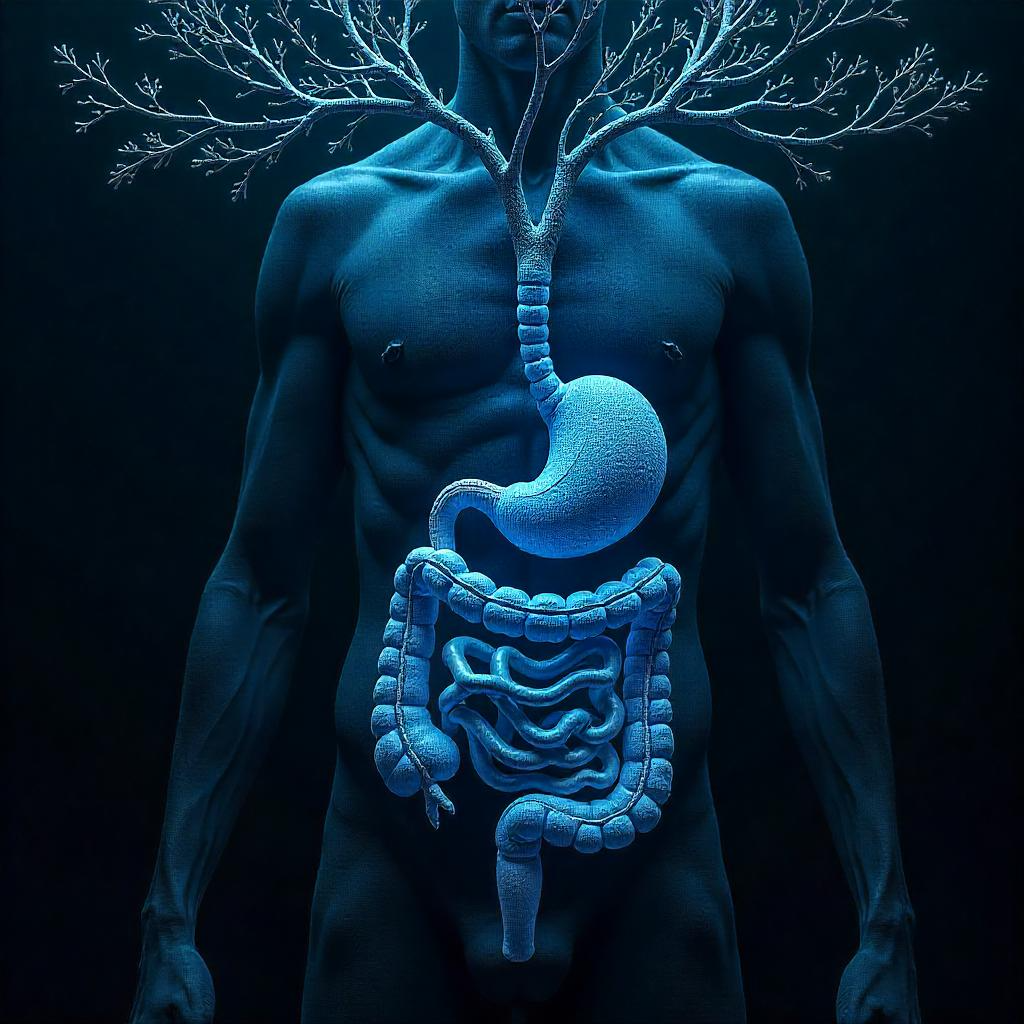Have you ever felt “butterflies in your stomach” before a big event? Or lost your appetite when you were upset? These are not just feelings—they’re real signs that your digestive system and your brain are deeply connected. Scientists call this the mind-gut connection, and it’s more powerful than you might think.
How is your digestive system and brain is connected?
Your gut isn’t just a food-processing machine. It’s often called the “second brain” because it has its own network of nerves and chemicals that communicate directly with your brain. In fact, your gut and brain are in constant conversation—affecting everything from your mood to how well you sleep.
Inside your digestive system lives a huge network of nerves called the enteric nervous system (ENS). It works independently but also stays in touch with your brain through something called the vagus nerve. This nerve carries messages in both directions—so when you’re feeling stressed, anxious, or happy, your gut feels it too. Likewise, if your gut is inflamed or out of balance, your brain picks up those signals and responds with things like low energy, brain fog, or even depression.But that’s not all. Did you know about 90% of your body’s serotonin—the feel-good chemical—is actually produced in the gut? That’s why problems like indigestion or bloating are often connected to mood issues.
Your gut microbiome: the hidden helper of your digestive system and your brain
Your gut is home to trillions of bacteria, both good and bad. This ecosystem is called the gut microbiome, and it plays a major role in how you feel every day. A healthy, balanced microbiome can help you feel calm, focused, and energetic. On the other hand, when it’s out of balance (a condition called dysbiosis), you might feel tired, anxious, or even depressed.A growing number of studies now link gut health to mental health conditions like anxiety, depression, and even memory problems. So yes your gut bacteria may have more control over your feelings than you think!

How it create stress and mood swings??
Think of a time you were nervous—did your stomach feel tight? Did you suddenly lose your appetite or run to the bathroom? That’s your brain sending SOS signals to your gut.Chronic stress can damage your gut lining, disturb your microbiome, and slow down digestion. At the same time, a troubled gut can send distress signals back to your brain, creating a cycle of discomfort, mood swings, or brain fog.This is especially common in people with IBS (Irritable Bowel Syndrome), who often experience both digestive and emotional symptoms at once.
Simple ways to support the digestive system and mind connection:
Thankfully, you don’t need fancy pills or expensive treatments to support your gut and brain health. Here are some easy and gentle ways to take care of both:
- Eat gut-loving food ,Fiber-rich fruits and veggies, fermented foods like yogurt or homemade curd, and whole grains can help your good gut bacteria thrive. Try to reduce processed foods and sugar—they feed the bad guys in your gut.
- Reduce stress naturallyDeep breathing, prayer, meditation, yoga, or even spending quiet time in nature can calm your mind and improve digestion. It’s amazing how much your gut relaxes when you do.
- Sleep wellA tired brain can mess up your digestion, and poor digestion can mess up your sleep. Aim for 7–8 hours of rest and stick to a calming bedtime routine.
- Stay activeGentle walks, stretching, or any movement you enjoy can improve blood flow, support gut function, and lift your mood—all at once.
- Consider natural probioticsFoods like buttermilk, pickle (achaar), and kanji (fermented carrot drink) are traditional Indian probiotic sources. These can boost your gut health without needing supplements.
- Stay hydratedWater helps break down food and move waste along your digestive tract. Keep a bottle nearby and sip throughout the day.
Effect of your thoughts on your digestive system and mind:
All our emotions are created by this microbes your sugar cravings, your mood swings, your anger everything because of this tiny little creatures. If you have more good bacteria and less bad bacteria. You are a happy person. But if you have the opposite ratio you are going to suffer from mental fatigue and anxiety.
Here is a more detailed post about
1)Anxiety
https://riseofthetimelords.com/wp-admin/post.php?post=124&action=edit
2)Mental fatigue https://riseofthetimelords.com/wp-admin/post.php?post=95&action=edit

Ancient knowledge from various cultures:
There are many cultures who might have known about this. Ancient ayurveda from India tells about the importance of good gut and their effects. Many Buddhist text and Jain text also talk about a healthy gut and various ways to maintain it. Although Christianity dosen’t talk about healthy gut but it also promots a healthy living by fasting , good thinking etc
Modern science started to admit this chapter in recent times . Many research has been done by some of them are
1)Microbiome-Driven Therapeutics: From Gut Health to Precision Medicine – MDPI, 2025]
🔗 Full Paper https://www.mdpi.com/2624-5647/7/1/7
2[Engineering Microbial Communities for Precision Medicine – Frontiers in Bioengineering, 2024]
🔗 Paper:https://www.frontiersin.org/articles/10.3389/fbioe.2024.1511149/full
3)[Functional Modification of Gut Bacteria for Disease Diagnosis and Treatment – PubMed/Elsevier, 2024]
Read Full paper:
https://pubmed.ncbi.nlm.nih.gov/38964334
In short,Your belly isn’t just about food—it’s about feelings too. The mind and gut are best friends, and when you take care of one, you automatically support the other. So next time your mood feels off, take a moment to check in with your gut. Maybe what you need isn’t just a pep talk—but a warm bowl of khichdi, a deep breath, and a little kindness toward your stomach.

